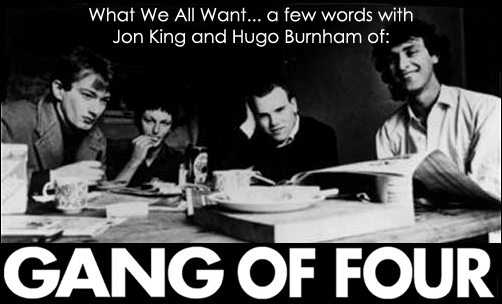
Interview conducted by Justin Anastasi and Joshua A. Pfeiffer

Interview conducted by Justin Anastasi and Joshua A. Pfeiffer
Justin and I recently had the chance to chat with Jon King (vocalist), and Hugo Burnham (drummer). Two of the original members of the legendary genre defining band "Gang of Four". For those of you unfamiliar with Gang of Four. Jon King, Andy Gill, Dave Allen, and Hugo Burnham helped define what we know today as Post-Punk. With their 1979 debut LP Entertainment!, and their follow up, 1981's Solid Gold, Gang of Four helped create the Punk meets Funk sound that so many bands would be lost without today. All four original members have recently re-united and have taken to the road together for the first time in twenty four years! So please sit back, toss Entertainment! on the turntable, and enjoy peaking into the minds of Gang of Four. ~ Joshua A. Pfeiffer
HB: We can't rely on it. It's not paying our mortgage...
JK: It's not something that's going to make much of a difference to the way we live. This is not our commercial cash in exercise.
HB: We're not the Pixies... and I don't mean that in a critical way.
JK: Well no actually it's more like the Sex Pistols who just did it openly for as much cash as they could get. We're doing this because we are musicians doing a really hard working serious thing, that's enjoyable. In fact I enjoy as much as I did in 1980. After that it all became a pain in the ass and in the end it wasn't worth bothering with. It was a serious project.
PP: Do you feel like it's come full circle? Like before you began you got right back to what you originally intended?
JK: Well kind of. I mean speaking from my point of view right now as a lyric writer. Some of those peculiarly mad lyrical things. There's one of the songs that ends with "there may be oil under rockall"
HB: Ether
HB: Trapped in Heaven's Lifestyle...
JK: A lot of that describes torture in Northern Ireland. You know suspected I.R.A. I mean the Abu Ghraib thing. If it wasn't about that, it was about something else. So when I look back at the things I did twenty years ago... You see I'm an old fucker... I look back at the person I was and I think I still agree with who I was and that's good, and I'm not embarrassed by it. You know because I think sometimes when you look back at the things you've done, you think "I wish I hadn't done that". But I'm glad I did that, I'm proud I did that. And amazingly it still seems to make sense.
HB: And it makes sense doing it together like this, you know when I referenced the Pixies it was really a light hearted thing. They are doing it seriously, they are having a lot of fun. More fun than they had the first time around and they are making more money than God (everyone laughs)! And we are not on that level. Which some people would say "Well you know the accounting job didn't work out". Which misses the point entirely. I mean it's an easy shot to make especially with a lot of acts from the eighties... although were from the 70's as much as the eighties... coming back round again and reforming in various incarnations. Which I think is great on some levels but there's clearly no cash in...
JK: Nothing wrong with making money...
HB: That was my next point. There is nothing wrong with making money.
JK: It's not like the Pixies really made any money the first time around
HB: Yeah exactly!
PP: Did you begin with the intention of doing music as a career?
HB: No we did it with the intention of having fun, and being able to get free beer (everyone laughs)!
JK: I don't think careers came in as an idea. You couldn't of written the music that we did and think it would be commercial. I mean you can't write a song like Anthrax and ever entertain that song being in the charts (laughs). I was amazed actually when Tourist got into the UK top thirty. In fact now it would have been number one. I mean someone described the opening of that as like a load of pigeons crashing into the back of a grand piano (everyone laughs). But it was banned in the UK. It's musically very radical and it's got this sort of synchronistic kind of thing. Got a bit of what we thought of as disco. I mean it shows how warped you can get, but we thought it sounded like a disco record. Basically it was another four on the floor drum beat and then it's got that fractured guitar. It very much goes through a kind of lunatic episode with this sort of hard driving bass line and these completely left field lyrics.
PP: During that time period, it was very volatile. Do you see the same climate now? Because it seems like all of these bands are even more relevant now. Lyrics like Anthrax, Damaged Goods, At Home He's a Tourist...
HB: The frightening thing for me is that I see even less artists and young people giving a damn about what is clearly potentially very volatile, or a very fractured and polarized society. I teach college kids and none of them seem to care. There's no one out in the streets. I mean literally or figuratively, there's no one out in the streets screaming or yelling (pause) and that's a disappointment.
PP: Why would everyone be so complacent? It seems like we're coming out of the period of the nineties which seemed very dance music oriented, I mean you'd think people would be starting to rile up.
JK: Well I was very interested in situationism, and one of the great strands of thought was about commodification and how you live in a society of spectacles, so you participate in society through spectacles and you observe that much of your life is derived from things that you're presented with. You define yourself in terms of types of emotion. where you become an observer, well actually you come to be observing yourself. So you observe yourself in a particular type of role and you start to arrange your own spectacles. This is a faintly complicated argument. Inevitably it leads to the sort of things that Hugo describes. Of course in the end you define your dreams and your existence through a series of pre-determined windows. You end up with similar types of mediocre outcomes so you become a collaborator in your own misery. It's a bit like Powerpoint presentations on Microsoft and then you get this experience looking at how to make a Powerpoint presentation. It's a very good example of commodification. It'll say something like "State your premise". Then the next one being "Explain yourself in five points, why you want this to happen, etc.". You know then wrap it up. I mean there's a series of steps you take and if you follow those steps you'll probably make a very good Powerpoint presentation. But will you say something outside of that. For example you might not want to use words. You might want to use pictures, you might want to use sounds. Whatever it is. But as soon as you embrace that thing you end up with something like everyone else's thing. One of the reasons I think what we did has become valuable to bands who want to reject collaborationism... from a whole range of sources, for example from Franz Ferdinand to the Chili Peppers... was because it was quite obvious that the Gang of Four wasn't about being collaborators. It's quite obvious that we tried to do something that was a different conversation. And so you know maybe we're speaking Sanskrit and the rest of the world is speaking English. But then musicians go "I get that", just like I got Jimi Hendrix guitar solos. You know when Jimi Hendrix played... and here we are in San Francisco... all he had to do was play on an electric guitar the Star Spangled Banner. He didn't do anything that was offensive. He didn't say "Fuck the Flag" or anything. He just played (John hums the Star Spangled Banner). And there were demonstrations against him. There were questions in Congress. They wanted to withdraw his passport. It was like he committed a criminal offense by playing the American National Anthem on an electric guitar. Because they thought this electric guitar thing was a revolutionary device.
JK: Which it was. But also that narrative that he kind of came up to which is the idea that he changed the world in a moment. Which is something that we always tried to do, and we try more and more... You saw the show last night?
PP: Yeah
JK: Well like the microwave (laughs).
PP: Yeah I saw that!
JK: Well I am the worlds leading microwave artist . I don't think there's anyone who comes close. Hugo?
HB: I've seen a lot of them but none... (everyone laughs)
JK: There's no one. No one to try and keep up with. I'm in a league of one (everyone laughs).
PP: And that was during He'd Send in the Army right?
JK: Yeah and that to me is probably my favorite live song. Not just because of course, my versatility on the microwave as displayed (everyone laughs). But actually it's got no verse, no chorus, no chord changes. But it's got a lot of feel in it. The closest thing to it... which is embarrassing to bring up... is a weird type of Jazz. Because we have a lot of triggers in it for things to change but it's got a feel to it. The whole thing is a deconstructed assault on what you might expect. It is a rock song so it's pretty loud. But it's got huge drop outs so it's got kind of a nod and a wink to other stuff.
HB: Like Jazz, or Dub Reggae...
JK: But it actually doesn't sound like any of those things, so it's, it's own beast and it has it's own audience. Our audience tend to have different responses. Some people think the microwave thing is just a gag, but it's not a gag at all. But it is funny. It's funny, but it's not a gag. Because it actually plays a proper musical part in the song.
PP: A lot of the bands that have been influenced by you almost have a sense of being overpolished. They have all the fashionable aspects. But when you guys play there's a sense of frustration underneath. I'm wondering what caused that for all of you? I just don't understand... the generation we're from seems to be very...
JK: It was the same in my generation. I mean there was maybe The Clash. There was a bunch of others... we used to share an office with The Slits, and The Pop Group... The Slits were fantastic, and The Pop Group were very much more dually political. I mean The Raincoats, Pere Ubu, there was all this kind of sense of anxiety. I mean I grew up with the idea that we were gonna be destroyed in a Nuclear War! I mean the post 9/11 paranoia that was nothing. You think of The Cuban Missile Crisis, and they were forty minutes away from launching the missiles. They actually had all of the B-52's around Russia and they had actually armed the warheads, they were forty minutes away and then they went (John snaps his fingers to signify the cancellation of the attack)...
HB: And our parents generation had already lived through a World War. Now your parents didn't, you are not within sight of a World War. There was still a little austerity coming through when we were growing up. Although things did start opening up in the sixties. Socially or even financially when kids started to have their own money, and autonomy from their parents. But now the difference is... why there's no frustration? Well because everything has been rather easy.
JK: And that's the interesting thing about the analysis of commodification. Because when were surrounded by commodities, and when you can choose anything. Nothing has any value...
HB: You can choose though. Everything is available. I mean when we grew up you could only get certain fruits and vegetables at certain times of the year. End of story... and that was just the way it was. Now you can get anything whenever.
PP: It seems like instead of rebelling, most people are just looking for profit. It doesn't seem like many people are creating anything anymore. It's this age of digital sampling and...
JK: It's a relentless drive to mediocrity. Then there's that Dilbert cartoon where he sits there in his cubicle, and there's that phrase called prairie dogging. And he'll stand up and...
PP: Pop his head over...
JK: Pop his head over yeah! And then he'll pop down again. We've got a world of prairie dogging. So it seems like sometimes a musician pops their head up as if called or something... Actually we need someone to set fire to the call center really.
PP: It seems like a lot of the newer, younger bands, take the punk aesthetic. But live more of a disco lifestyle. It's all about excess. They aren't really trying to make a statement, they're just kind of there.
JK: Well that can be ok... take a look at The Beastie Boys. Fight for the right to party. I mean you do have to fight for the right to party. But at the same time...
HB: Not everything has to be serious. I mean fight for your right to party covers both sides. Your fighting. You know, (Hugo sings "Your mom took away your best porno mag"). I mean you know the divide is right there. But that song was as annoying to parents as anything anyone else was doing. It was dirty, it got banned. It had naked girls on stage and you know it's brilliant!
PP: We read somewhere that you (John) and Andy used to play a lot of Reggae records over the intercom when you were at Leeds University.
JK: Oh yeah I mean they had those kind of discos where they'd play awful songs about Hi-Ho Silver Lining (laughs).
HB: Yeah I mean I used to DJ at some of those things!
PP: What did you feel about that at the time?
JK: Oh well it made me feel like I had to vomit.
HB: No I think that was the drink (everyone laughs).
JK: Well we used to sometimes go and ask if they could play something like Desmond Dekker. Though they wouldn't always have those albums, but there were other tracks they would play and it was fantastic. It used to clear the floor. So the DJ's used to loathe us. They had this thing where they were forced to do requests. We had the best looking girls and they loved it, because we could dance. We used to dance together (John looks at Hugo).
HB: Yeah we used to dance together kind of passionately, so the girls would look and say things like "Oooo are they? Aren't they? What of those blokes over there with the short hair and their trousers all flared?" (everyone laughs)
PP: (Justin) You don't realize how relevant this is...
PP: (Josh) Yeah it just hasn't changed at all...
JK: Well yeah things don't change. You know you assert your life to be independent. You assert your right to follow your own social path, your own sexual path, your own political path. But you do have to assert it.
PP: Well we definitely think there is this effort, this groove through your sound and I find it interesting that we look around and there's all this dance oriented music, but hardly any live music. We would really like to see that come back...
HB: Well I'd far rather if there's any result or residual from us coming back round again, it's not that there's more Bloc Parties and Franz Ferdinands or whatever... and I don't mean that with any disrespect... but bands need to start to think and challenge themselves to make whatever noise it is, but not to just ape what we're doing, but challenge themselves the way we are challenging ourselves. Do it with some authenticity, not just a carbon copy...
PP: Yeah be more inspired by it... Actually we just saw Peter Hook. Josh just gave him a comp, I mean it seems like...
HB: Who?
PP: Peter Hook
HB: Oh Hooky! Yeah right...
PP: Well it just seems like previous generations... that period of music, that I like to block in between 76' and 84'... it's like there was just this spirit there, and we don't see it in the people we meet these days. I mean there's just so much tension there, yet still the creativity just goes on and on and on and it just doesn't die and I'm just wondering... I don't understand why that doesn't happen as much now?
PP: Yeah well we notice that a number of bands have this attitude about them, but there's this lack of spirit. I don't understand it, and like you say... maybe they're just not challenging themselves. I actually wanted to know what inspired the song Anthrax? I mean lyrically it's a very vicious song. I find myself listening to it a lot on days when I'm not having that great of a time.
JK: Well that's kind of an unusual song because that song was blocked out on a piece of paper. I mean you block out this fantastic drum and bass part, but you don't know what it is. I wrote the lead lyric on it's own, on a bit of paper. Then we went in the studio and Andy improvised the guitar part. It was kind of like feedback, vocals, dropout, feedback. That's kind of how it was put together on a piece of paper. It was tried kind of a different way than Damaged Goods. But they all depend on this sort of groove. So songs like Anthrax may be easy to block out on paper but unless you hear this sort of (John makes loud rhythmic thumping noises). Like this sort of P-Funk thing. Something like Slave. It's got that black music thing in it. It's a bit like Simply Red trying to play soul music. Well not quite like Simply Red.
PP: Yeah and the guitar lines, the feedback that just comes in...
JK: Yeah, it's quite difficult to play it though. Actually the Futureheads, who we know very well. They know a lot of our songs better than we do. So when Andy couldn't remember the chords. He'd ask The Futureheads to show him the chords to our songs. The other day at Coachella...
HB: They'd come on and we asked them to play Anthrax...
JK: We asked them to play Anthrax with us and he said, "Oh I don't know how to do feedback"... So bloody ell' y'know.
HB: Young people they can't play feedback (everyone laughs)!
PP: I really feel like we are in kind of an age of commodity. Like everything is a boxed in product. It's almost like what T.S. Elliot would say. It's like expressions and cheap gestures. You know, but for you guys it's obviously very real.
HB: It is, what it is.
JK: It's like Popeye said, "I am what I am"...
HB: we eat what we are.
JK: We is what we is. Anyways do you guys have time for one last question? We've got to get back in there and get my stuff.
PP: Oh yeah no problem. About the double CD. Do you want to tell us anything about what's behind that? How you chose the bands?
JK: I mean you got everyone from the Yeah Yeah Yeahs, who have done Uniform, and No Doubt who did..
HB: No Doubt have done I can't remember what...
PP: What did Massive Attack do? I'm actually really interested to hear what they do. They're one of my favorite bands.
JK: Which one are they doing?
HB: I dunno, I dunno?
JK: They sampled so much...
HB: When my wife was a publicist for awhile on Virgin Records, I sort of met them... I'd never met them before. But met them in L.A. they were just like all over, well Gang of Four being so amazing. So when we first talked we were like, well Massive Attack if they're still alive and doing it. I think we should get them to do it!
PP: Yeah, I think it's just the one guy now...
HB: But we should get them to do it. You know obviously some people we wanted couldn't, because they weren't available. You know I would have loved for the Red Hot Chili Peppers to make something. To do something, but they're making a record of their own. So it was like, let's do it in an interesting way. Let's take a risk, because what they do with it could be something we might not like. But it will be interesting.
PP: Yeah it will be interesting to see.
JK: Anyway I gotta go.
HB: Yeah I gotta go and get my bags.
PP: Oh yeah thanks a lot it was really nice to meet you.
JK: Yeah see you later then, it was nice to meet you.
HB: Yeah it was real nice to meet you guys. A real pleasure. Thank you.
Also check out these other Gang of Four sites for more information, bios, photos, and discographies:
We'd like to thank Karen and Marciano for setting up this interview, The Fillmore, and of course Gang of Four for spending some time to talk with us!
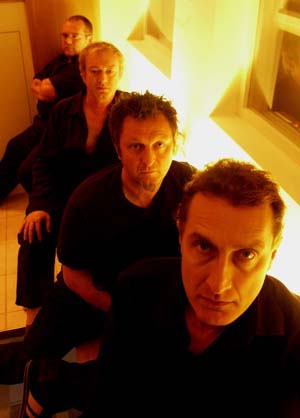 PP: We're interested in how you guys have been on the tour? Are you having fun? Is it still a rush?
JK: I think it's actually more fun than it used to be. Because it's not a career. I think that when you start off with bands you do things for fun. You do things because you passionately believe in them. Sometimes, no not sometimes, they almost always turn into careers. They turn into things that you do because you do them. I mean there are great bands who manage somehow or other to rise above that stuff. Everyone goes through it. But quite the majority of bands give up at some point or other Or else they become parodies of themselves. And we just packed up before we became a parody of ourselves. In fact what we tried to do was change things as we went along before we changed too much. Because we got bored with it being like it was, we tried to change too much. So sometimes you end up doing Ill judged things. For instance, a Scritti Politti kind of thing. We are doing this because we want to. None of us have to do this.
PP: We're interested in how you guys have been on the tour? Are you having fun? Is it still a rush?
JK: I think it's actually more fun than it used to be. Because it's not a career. I think that when you start off with bands you do things for fun. You do things because you passionately believe in them. Sometimes, no not sometimes, they almost always turn into careers. They turn into things that you do because you do them. I mean there are great bands who manage somehow or other to rise above that stuff. Everyone goes through it. But quite the majority of bands give up at some point or other Or else they become parodies of themselves. And we just packed up before we became a parody of ourselves. In fact what we tried to do was change things as we went along before we changed too much. Because we got bored with it being like it was, we tried to change too much. So sometimes you end up doing Ill judged things. For instance, a Scritti Politti kind of thing. We are doing this because we want to. None of us have to do this.
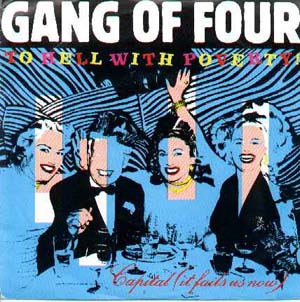 JK: There's a lyric in that, there may be oil under rockall. Rockall is a funny outcrop of rock in the Irish Sea that's about as big as this building, or smaller. It's just a lump of rock, the top of a Sea Mountain which the British Government laid claim to and it is I think a British Territory. And of course by having that spike of rock which is just covered in bird shit basically, uninhabitable, and it has about two hundred miles of ocean around it. So I wrote this thing "there may be oil under rockall", which is kind of a gag for it. Actually there is oil under rockall. So then you think of songs like To Hell With Poverty. As a lyric it's very relevant. In fact that same song corked up with ether...
JK: There's a lyric in that, there may be oil under rockall. Rockall is a funny outcrop of rock in the Irish Sea that's about as big as this building, or smaller. It's just a lump of rock, the top of a Sea Mountain which the British Government laid claim to and it is I think a British Territory. And of course by having that spike of rock which is just covered in bird shit basically, uninhabitable, and it has about two hundred miles of ocean around it. So I wrote this thing "there may be oil under rockall", which is kind of a gag for it. Actually there is oil under rockall. So then you think of songs like To Hell With Poverty. As a lyric it's very relevant. In fact that same song corked up with ether...
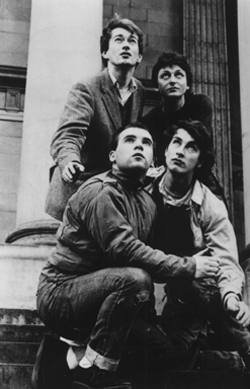 JK: I mean the definition of being a musician is that you get paid for what you do. Just as being an artist. All artists always worry because you have such a volatile type of career. Again it's much more fun to do this now, because the money doesn't matter much at all.
JK: I mean the definition of being a musician is that you get paid for what you do. Just as being an artist. All artists always worry because you have such a volatile type of career. Again it's much more fun to do this now, because the money doesn't matter much at all.
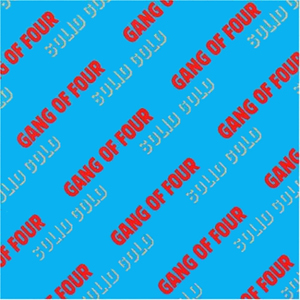 HB: Which it was!
HB: Which it was!
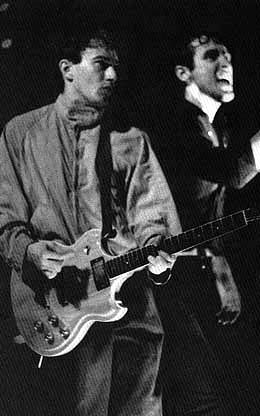 JK: Now here's an interesting thing about pricing. Take oil for example. I mean there's enough oil for another hundred years at least. But why is oil more or less expensive at any one time? The interesting thing about exchange economies is that when you have a poor economy you think of things in terms of you know I'll give you two bits of wood if you carve me a wheel or something. That's the idea of exchange economies. Then you get into our economies where the only thing that becomes valuable is the price of things. So you start valuing things according to how expensive they are. So your trainers (John points at his shoes) become valuable... well they only cost fifty cents to make. But the actual value of them is their price... It's a very interesting thing you see, everything is topsy turvy so it's intrinsic exchange value is basically nil. But it's real value lies in how expensive or not it is. So that kind of conversation was the sort of thing I was very interested in when writing songs like At Home He's a Tourist. Because haven written that line the rest of the song is quite easy to write. But you put it on it's head, and you say the one place that you are a tourist is the one place that you think your not. So there tends to be these logical reversals of situations. Which I think very relevant all the time. But when you go through the dance... hedonistic side... which of course is great fun. I mean there is no better thing then listening to Dance Dance Dance by Chic (laughs). I mean I am not a puritan or nothing but those lessons are brilliant. The idea of starting a different conversation is one thing that seemed to be dangerous in the sort of conversations that we were a part of or played in. I mean Tourist was banned. It was really stamped on. So there is suddenly an awareness about dangerous conversations. The one thing you should do if your a musician, or young is, fight the power. That's the one thing you should do! For Christs sake, fight, oppose your parents! Disagree with people, but don't just say well you know my dads got a beamer so I must have one!
JK: Now here's an interesting thing about pricing. Take oil for example. I mean there's enough oil for another hundred years at least. But why is oil more or less expensive at any one time? The interesting thing about exchange economies is that when you have a poor economy you think of things in terms of you know I'll give you two bits of wood if you carve me a wheel or something. That's the idea of exchange economies. Then you get into our economies where the only thing that becomes valuable is the price of things. So you start valuing things according to how expensive they are. So your trainers (John points at his shoes) become valuable... well they only cost fifty cents to make. But the actual value of them is their price... It's a very interesting thing you see, everything is topsy turvy so it's intrinsic exchange value is basically nil. But it's real value lies in how expensive or not it is. So that kind of conversation was the sort of thing I was very interested in when writing songs like At Home He's a Tourist. Because haven written that line the rest of the song is quite easy to write. But you put it on it's head, and you say the one place that you are a tourist is the one place that you think your not. So there tends to be these logical reversals of situations. Which I think very relevant all the time. But when you go through the dance... hedonistic side... which of course is great fun. I mean there is no better thing then listening to Dance Dance Dance by Chic (laughs). I mean I am not a puritan or nothing but those lessons are brilliant. The idea of starting a different conversation is one thing that seemed to be dangerous in the sort of conversations that we were a part of or played in. I mean Tourist was banned. It was really stamped on. So there is suddenly an awareness about dangerous conversations. The one thing you should do if your a musician, or young is, fight the power. That's the one thing you should do! For Christs sake, fight, oppose your parents! Disagree with people, but don't just say well you know my dads got a beamer so I must have one!
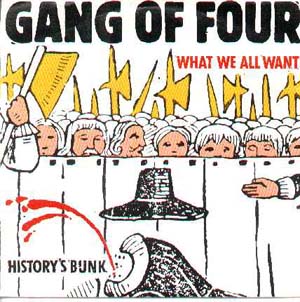 JK: But to be honest with you it's about category. You know that song What We All Want it's our attempt to write a heavy funk song. It's got a massive funk plan, and the rhythm section was driving it. It is one of those things where your mashing up categories. And I think that on some of them, we are quite a bit like that... Punk-Funk thing. I mean we weren't really quite aware of that. But we wanted it to be like that. I mean I went to see P-Funk, Brides of Funkenstein, and you know Chic. I mean my favorite bands were Funkadelic, you know what I mean.
JK: But to be honest with you it's about category. You know that song What We All Want it's our attempt to write a heavy funk song. It's got a massive funk plan, and the rhythm section was driving it. It is one of those things where your mashing up categories. And I think that on some of them, we are quite a bit like that... Punk-Funk thing. I mean we weren't really quite aware of that. But we wanted it to be like that. I mean I went to see P-Funk, Brides of Funkenstein, and you know Chic. I mean my favorite bands were Funkadelic, you know what I mean.
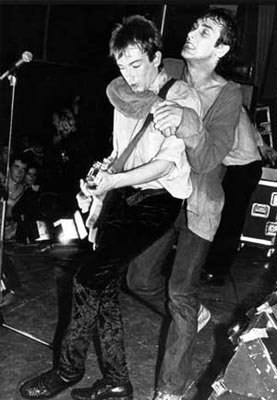 JK: I mean there is a lot of competitiveness in it. You're never really aware of it quite at the time. But without someone to really disagree with about how to move on... I mean in art, the great competitive people like say Picasso and Matisse... I'm not saying that New Order is like Picasso and Matisse... but the fact is that they kind of loved and hated each other. Everything that Picasso did was not much like what Matisse did and they kind of drove themselves on and on and on to be more extreme and the thrive to be more extreme is the key thing. You know when we do things that have been more or less successful the more extreme they've been, or more abstract. Like He'd Send in the Army, or Paralyzed, or What We All Want, even I'd go like "Oh that sounds more like us!" When things fail you've got an idea of what to do. Like what Green did with the first Scritti Politti album. He started to do this kind of alternate look at soul or something through some weird window. Of course he could only do one thing, that one record. The rest of it was rubbish. Because it was a confection, it wasn't something he passionately believed... well maybe that's not fair... but that absolute determination to not fuzz it over. It's either gonna be black or white. I think when I went and saw The Secret Machines for example, I went to see them live and I realized they've got this whimsy side to them. They've got this kind of Led Zeppelin influence and these ridiculously crap lyrics because they didn't take it far enough (laughs).
JK: I mean there is a lot of competitiveness in it. You're never really aware of it quite at the time. But without someone to really disagree with about how to move on... I mean in art, the great competitive people like say Picasso and Matisse... I'm not saying that New Order is like Picasso and Matisse... but the fact is that they kind of loved and hated each other. Everything that Picasso did was not much like what Matisse did and they kind of drove themselves on and on and on to be more extreme and the thrive to be more extreme is the key thing. You know when we do things that have been more or less successful the more extreme they've been, or more abstract. Like He'd Send in the Army, or Paralyzed, or What We All Want, even I'd go like "Oh that sounds more like us!" When things fail you've got an idea of what to do. Like what Green did with the first Scritti Politti album. He started to do this kind of alternate look at soul or something through some weird window. Of course he could only do one thing, that one record. The rest of it was rubbish. Because it was a confection, it wasn't something he passionately believed... well maybe that's not fair... but that absolute determination to not fuzz it over. It's either gonna be black or white. I think when I went and saw The Secret Machines for example, I went to see them live and I realized they've got this whimsy side to them. They've got this kind of Led Zeppelin influence and these ridiculously crap lyrics because they didn't take it far enough (laughs).
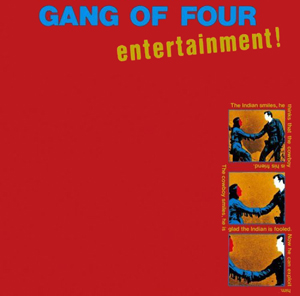 HB: Well it was an idea of, well if we're going to get together... you know clearly we don't have the desire or the time to write new songs and all that... what do we feel now about our old songs? Inevitably when you make a record, after you've been on the road with it for a year or two songs have changed, usually for the better. They've certainly changed and developed. I think it's fair to say, that Entertainment! as fabulous as it was. We all wished the drums sounded a bit less like cardboard boxes with wool inside them (laughs). So things like that decided that we would re-record these fourteen songs, predominantly from the first two records. Andy's making the record and to really make it interesting beyond just re-recording our songs. Lets ask fourteen other artists. The obvious sort of acolyte artists. Or people who have made it clear that they love, or have loved Gang of Four. It's like, "Oh cool your interesting yourself. Here's a track do what you will."
HB: Well it was an idea of, well if we're going to get together... you know clearly we don't have the desire or the time to write new songs and all that... what do we feel now about our old songs? Inevitably when you make a record, after you've been on the road with it for a year or two songs have changed, usually for the better. They've certainly changed and developed. I think it's fair to say, that Entertainment! as fabulous as it was. We all wished the drums sounded a bit less like cardboard boxes with wool inside them (laughs). So things like that decided that we would re-record these fourteen songs, predominantly from the first two records. Andy's making the record and to really make it interesting beyond just re-recording our songs. Lets ask fourteen other artists. The obvious sort of acolyte artists. Or people who have made it clear that they love, or have loved Gang of Four. It's like, "Oh cool your interesting yourself. Here's a track do what you will."
You can catch Gang of Four on tour right now. Check out their official site for tour dates in your area:
http://www.gangoffour.co.uk/
http://www.gillmusic.com
http://www.notgreatmen.com/